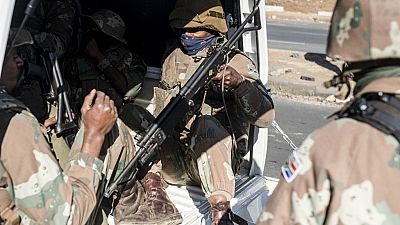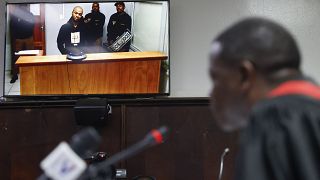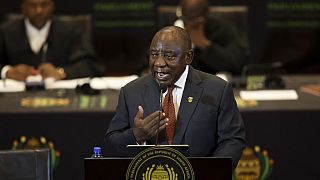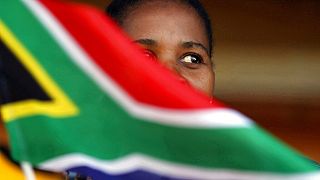South Africa
South Africa has never really been affected by jihadist attacks. Its democracy is solid and its economy stable. Yet, it is considered to be a stronghold for the financing of the Islamic State (EI) and other Islamist organizations.
The continent's most developed country was the first to be singled out by the United States, which in 2022 sanctioned South African companies and nationals suspected of facilitating fund transfers for the benefit of the EI, whose main area of conquest Africa has become since the loss of its caliphate between Iraq and Syria in 2019.
"There hasn't been enough vigilance for 20 years because South Africa hasn't been affected by terrorism problems at all," Hans-Jakob Schindler, director of the Counter-Extremism Project (CEP) think tank explains.
"It was the Americans who said: there's something wrong with your country", adds the former UN expert. "The whole government is now at work".
In March, the Financial Action Task Force (FATF), an anti-money laundering organization based in Paris, placed South Africa on a "grey list" of countries lacking rigor in the fight against the financing of illicit activities.
"It is now internationally accepted that we are a hub," laments South African anti-terrorism expert Jasmine Opperman. "South Africa is the hunting ground for money transfers (...) in the hands of terrorists", she believes, referring also to the role of activists sympathetic to al-Qaeda, the Palestinian Hamas or Hezbollah close to Iran.
Martin Ewi, coordinator of a crime observatory for the Institute for Security Studies (ISS) in Pretoria, confirms that "a number of incidents have unfortunately given the impression that South Africa is a hub for the financing of terrorism".
Increased funds
This phenomenon is linked in particular to the democratic nature of the country and a banking system that is both highly developed and sufficiently open to allow all kinds of occult activities.
This realization comes at a time when the EI, like al-Qaeda, has made Africa the central axis of its development. Groups that have pledged allegiance to it are now spreading in Somalia and the Sahel, around Lake Chad and in Mozambique, as well as in the Democratic Republic of Congo (DRC).
"Over the past five years, Africa has become increasingly important" for the group, notes Hans-Jakob Schindler.
But South Africa's role in the proliferation of the EI dates back more than a decade, says Ryan Cummings, an analyst for the private consultancy Signal Risk, based in Cape Town.
He cites intelligence reports that the Somali Shebab funneled funds there after the attacks on the Westgate shopping center in Nairobi in 2013.
"Obviously, with the rise of the EI and its direct presence in Mozambique", Ryan Cummings points out, the theory of an "increase in funds (...) coming from South Africa to Mozambique and groups on the African continent, in particular the EI subsidiary in the DRC" emerges.
It's an explosive combination: a well-functioning financial system, a large and active Muslim community, a democracy with porous borders, endemic corruption and long-established criminal organizations.
57,000 sim cards
The target is "well-known South African extremist figures who have been active for a number of years. They benefit from open financial structures", sums up Tore Hamming, from the International Center for the Study of Radicalization in London.
The funds come from a whole range of activities, from drug trafficking and precious minerals to hostage-taking and extortion via fake profiles on the dating app Tinder.
South African police statistics show that the number of kidnappings doubled (4,000) between July and September 2022, compared with the previous three months.
According to the US Treasury, front companies operating in the precious stones, gold and construction sectors are also involved.
The money circulates via a multitude of transfers of sums too small to attract attention. The equivalent of more than 315 million euros left South Africa for Kenya, Somalia, Nigeria and Bangladesh, via some 57,000 unregistered Sim cards, between 2020 and 2021, according to an investigation by the South African weekly Sunday Times.
A process that none of the world's most competent secret services would have been able to detect. Other funds pass through the hawala system, an informal payment method based on trust, which is even more complex to trace than bank transfers.
Reopening old cases
The scale of the sums destined for jihadists remains unknown, as does the logic behind their distribution within the groups' regional subsidiaries. But there is no shortage of money: the jihadist groups "earn more than they need to", says Hans-Jakob Schindler.
"We can't believe for a second that any company or economic activity in an area they control could continue to operate without paying them. That has never happened."
Internal documents from the EI, consulted by Tore Hamming, show that half of the funds collected by them in Somalia are kept. A quarter was paid to the organization's head office, with the remaining quarter divided between Mozambique and the DRC.
One of the South African suspects singled out by Washington is Farhad Hoomer, 47, based in Durban. In 2022, he was sanctioned by the US Treasury for "an increasingly central role in facilitating the transfer of funds from the top to subsidiaries across Africa".
He denies working for the EI. He spoke of his "surprise", saying he had "no idea" where the sanctions came from. "I've been waiting for proof for a year".
Arrested in 2018, he was accused of preparing to plant incendiary devices near mosques and shops before all charges were dropped.
But South Africa has since reopened certain cases and is demonstrating its desire to clean up its financial system. Martin Ewi, who works hand in hand with the government, points out that several individuals are being investigated for offenses that now date back to 2017-2018.
"The government has adopted a very proactive approach", he wants to believe today.
Several pieces of legislation were rushed through Parliament, including one on money laundering and combating the financing of terrorism, signed into law by President Cyril Ramaphosa just before Christmas.
And on 19 May, Security Minister Khumbudzo Ntshavheni promised to ensure that "South African territory will no longer be used to prepare, facilitate or carry out acts of terrorism, or to acquire, move, store and use funds in support of terrorism".













01:09
Suspects in Moscow attack appear in court
01:00
South Africa: Two suspects appear in court for murder of three Egyptian monks
01:07
Mozambique to receive support from Algeria in anti-terror fight
01:06
Mozambique: Jihadist attacks displace thousands in northern province of Cabo Delgado
Go to video
Niger says all French troops will have left by December 22
01:11
Springbok 'legends' start homecoming World Cup victory tour